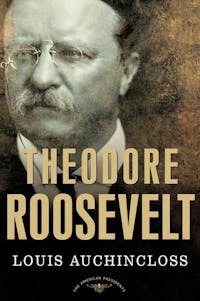Theodore Roosevelt
The American Presidents Series: The 26th President, 1901-1909
 Download image
Download image
ISBN10: 0805069062
ISBN13: 9780805069068
Hardcover
176 Pages
$34.00
CA$46.00
The so-called "American century" opened with the election of that quintessentially American adventurer, Theodore Roosevelt. Louis Auchincloss's biography introduces us to the man behind the many myths comprising Theodore Roosevelt. From his early involvement in the politics of New York City and then New York State, we trace his celebrated military career and finally his ascent to the national political stage. Caricatured through history as the "bull moose," Roosevelt was in fact a man of extraordinary discipline whose refined and literate tastes actually helped spawn his fascination with the rough-and-ready worlds of war and wilderness. Auchincloss briskly recounts the significant contributions of Roosevelt's career and administration.
Reviews
Praise for Theodore Roosevelt
"Theodore Roosevelt has long intrigued me as a complex dynamo of seeming inconsistencies: the asthmatic aristocrat who turned himself into the hardiest of cowboys, the passionate conservationist whose greatest joy was in killing big game, the lover of glorious war who won the Nobel Peace Prize, the loyal Republican who endorsed a presidential candidate he detested but who later split his party in two, the Roman father who dispatched his adored sons to the hottest battle sites, and the great political idealist who yet could work efficiently with the most brazen city bosses. His daughter Alice called him the perfect leader for an imperial age—we wonder, a bit ruefully, how he would fit into our own."—Louis Auchincloss on Theodore Roosevelt
"[Auchincloss] brilliantly analyzes Roosevelt and his presidency. His book is filled with penetrating observations. A graceful writer, Auchincloss explains why Roosevelt became a progressive and sets him in the wider context of his time. It would be hard to think of a better introduction."—Jacob Heilbrunn, Los Angeles Times Book Review
"Auchincloss quotes extensively from Roosevelt's writings, which are as awe-inspiring and dramatic as any novelist's. It's a wonderful way of bringing this giant to life on the page. A master craftsman's rendering of a character who needs no embellishment."—Kirkus Reviews
"'It was the great and deciding moment of TR's life.' Surely, Auchincloss means the death of Roosevelt's mother and wife on the same day? Or the charge up San Juan Hill? No, the superlative moment goes to Roosevelt's decision not to bolt the Republican Party in 1884, which would have ruined his political future. Auchincloss supports such propositions so fluidly as to make yet another book on TR well worth reading. For those who aren't familiar with Roosevelt's career, this precis is a perfect alternative to the long biographies by Edmund Morris or David McCullough, particularly in arguing for TR's place among the presidential 'greats.' With Roosevelt's advocacy of masculine and martial virtues and his reputation as an imperialist, ranking him among the elite chief magistrates might not be an obvious choice for contemporary critics, a fact Auchincloss acknowledges. For the author, it was TR's vigorous leadership as a progressive president, rather than what he particularly achieved as such, that earns him the plaudit. A sparkling biographical summary."—Gilbert Taylor, Booklist
"The statement 'radical . . . action must be taken to do away with the effects of arrogant and selfish greed on the part of the capitalist' might sound like Karl Marx or Eugene V. Debs, but it comes from Theodore Roosevelt. Yet this president was 'neither by birth, upbringing, or mature inclination in the least bit a radical,' according to eminent novelist Auchincloss. TR (1858-1919), he says, embodied numerous contradictions for which he has been periodically pilloried by liberals and conservatives alike. Responsible for much progressive legislation, he passed the Pure Food and Drug Act, created federal forest lands and obtained antitrust legislation; he was also an aristocrat who was against monopolies because they were not gentlemanly, invaded Panama to build the canal and casually exhibited racism during the Spanish-American War. Born into a wealthy New York family, Roosevelt overcame bad health in childhood to embody an image of manliness (losing an eye in a boxing match against a 'younger and stronger' man) and bluster that defined his era. He also avidly read Dickens, Thackeray and Greek drama . . . He paints a vivid portrait . . . A compelling, novelistic approach to history. Readers curious about Roosevelt but intimidated by Edmund Morris's multi-volume bio can wet their toes in this slim text, the first title in the American Presidents series, edited by eminent historian Arthur M. Schlesinger Jr."—Publishers Weekly
Reviews from Goodreads
BOOK EXCERPTS
Read an Excerpt
Listen to an Excerpt from the Audiobook
Download MP3MEDIA
Watch
Theodore Roosevelt by Louis Auchincloss--Audiobook Excerpt
Listen to this audiobook excerpt from Louis Auchincloss' biography Theodore Roosevelt, an intimate portrait of the first president of the 20th century. The American century opened with the election of that quintessentially American adventurer, Theodore Roosevelt. Louis Auchincloss's warm and knowing biography introduces us to the man behind the many myths of Theodore Roosevelt.
Share This


